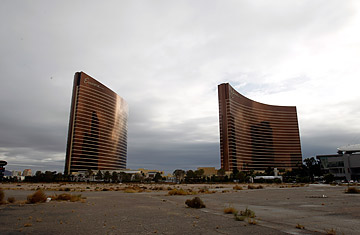
The site of the demolished Frontier casino sits vacant on the Las Vegas Strip on Friday, Dec. 2, 2011, in Las Vegas.
(2 of 2)
Oh, then there's the house market. Median home values were $290,000 in 2006 — small starter homes on the suburban fringes were routinely selling for well north of $200,000. Today the median value stands at around $100,000, a figure which accounts for short sales and foreclosures. Homes in the better parts of town are holding their own, and there are signs of construction picking up a tad. Over the last few years the city is averaging around 1,500 to 2,000 new housing starts, according to the Clark County Department of Planning. But it's far off from 4,000 to 12,000 units going up during the boom. "What we have to look forward to," says Anderson, "is moderate growth but arguably more sustainable."
Gaming and tourism still drive the Las Vegas economy — the sector has added 10,500 new jobs — and will ultimately propel the city's economy forward. But it's common knowledge here that in the long run, Las Vegas can't simply sit back and count on new waves of megaresorts to keep the cash till full.
Somer Hollingsworth, president of the Nevada Development Agency, which is tasked with recruiting new businesses, says that after years of talk, the region is really getting serious about diversification. A recent report issued by the Las Vegas-based think tank Brookings Mountain West, identified seven industries the region state should seek to nurture or expand, including clean energy, IT ecosystems, health and medical services and aerospace.
There have been some notable new firms in recent years. Online shoe retailer Zappos arrived in 2004. Switch runs one of the world largest data centers, a two million square foot behemoth that allows Fortune 1000 companies to back up their servers. (In addition to abundant sunshine, Las Vegas also is immune from virtually every natural disaster.) Hollingsworth touts a company called Linq360, which provides space for IT companies working in the hospitality industry to creatively collaborate.
Meanwhile, Las Vegas is trying to build up a solar energy sector, and Hollingsworth wants to see the region go after a bigger piece of the aerospace and defense pie. Predator drones are already operated out of nearby Creech Air Force, about 35 miles northwest of town; he dreams of moving R&D and manufacturing of the drones to Las Vegas.
Admittedly, plans like that represent "stretch goals for us," says Hollingsworth, efforts to think big and think beyond one more glittering resort. "If we really want to move this thing up and play with the big guys, we have to create some high quality jobs."
But though Las Vegas' weather and lack of income taxes are draws for new businesses, the state's mediocre education and sense of rootlessness are liabilities. "We haven't seen a lot of whole lot of bringing new industries wholesale to Southern Nevada," says Gordon. "That doesn't happen over night." In 2000, 24.5% of the workforce was involved in gaming; two years ago the number was down to only 19.5%.
Still, the biggest symbol of Las Vegas's recovery is not on the Strip. Caesars is planning a $500 million entertainment district on the Strip centered on a 550-foot Ferris Wheel, but the real action has shifted downtown. In recent weeks the city has seen the opening of a $470 million performing arts complex, a $42 million mob museum — a driving force of outgoing mayor (and former mob defense attorney) Oscar Goodman, and a new city hall. This comes on top of massive investments downtown in recent years, which has seen the opening of a BRT line through the central city, the completion of a new downtown bus terminal and the ongoing renovation of old downtown casinos.
"I'm very optimistic about the status of the downtown economy," says Rich Worthington, the president of the Molasky Group of Companies, a major developer. "I've been involved in the last 14-15 years. I think it's on the upswing again."
The optimism is catching among local businesses — even if the analysts aren't ready to place any big bets. Tonia Fike, a master stylist with the Square Colour Salon and Spa in the prosperous Summerlin district on the west edge of the Las Vegas Valley says customers are still spending less money per visit — but there are more of them coming in and her sales have risen 7.3% since 2010. "We call it more butts in the chair," she says and the salon is now getting ready to expand and provide room to train more stylists. Things had gotten so bad during the recession that she decided, against her policy, to accept personal checks. Now, she is switching back to her preferred mode of payment: credit cards. "That is reflective of people becoming a little more stable," she says.
Gary Kibler, who owns Porta-Vac Pool Services, has been in the pool maintenance business for 27 years. He's seen all types, from showgirls to attorneys to magicians. He also remembers the Vegas boom years as "a feeding frenzy" with new homes and pools being built at breakneck speed. All that dried up with the recession and the foreclosures crisis. Now, however, he's noticed that "people are buying these foreclosed homes and they feel they have extra money. They're much more in a spending mood than a couple years ago." Clients are so happy to have good homes at bargain basement prices that they're more willing to splurge for that $1,000 new filter. He doesn't expect the foreclosure invetory to work itself out for another four to five years. But it's setting up another transformation of Vegas. "This could become the world's largest garage sale."
